Author: Amy Chavez
ARTISAN CIRCLE ANNOUNCES TWO NEW TENANTS
Younger Partners Sign Leases with Rose Couture Nail Bar and Snap Kitchen.


FORT WORTH, Texas (May 18, 2023) – Younger Partners announced today that the firm has executed leases with Rose Couture Nail Bar and Snap Kitchen.
Rose Couture Nail Bar’s lease includes 3,466 square feet of space at 2809 W. 7th Street. Featuring modern and luxurious amenities, Rose Couture offers premium services which include manicures and pedicures, facial waxing, brow and eyelash tinting, and perming. The salon is designed to provide a unique chic feel, to complement their service offerings. Learn more at www.rcnailbar.com. Rose Couture is expected to open on or before September 1st. The terms of the lease were undisclosed.
Snap Kitchen’s lease includes 1,224 square feet of space at 2941 W. 7th Street. Snap Kitchen offers healthy and delicious ready-to-eat meals, sides, drinks, snacks and more designed to support healthy lifestyles. Snap Kitchen partners with local Texas vendors to ensure it uses sustainably sourced, local ingredients where it can. Learn more at www.snapkitchen.com. The location is scheduled to open this summer. The terms of the lease were undisclosed.
“Snap Kitchen’s Fort Worth customers are some of our most loyal and valued,” said Tony Smith, CEO of Snap Kitchen. “We are excited about this new location at Artisan Circle and the opportunity to serve more nutritious and flavorful dishes to folks in one of Fort Worth’s most bustling, walkable communities.”
“Convenient access to fresh food and beauty treatments are just two examples of what will make Artisan Circle a top-of-mind destination for our multi-generational customers,” said Kathy Permenter, co-managing partner of Younger Partners. “We strive to provide our customers with a diverse selection of high-quality products and services, and these new tenants will help us achieve that goal. We are confident that Rose Couture Nail Salon and Snap Kitchen will be popular additions to Artisan Circle, and we look forward to seeing them thrive.”
Younger Partners Investments purchased Artisan Circle in August of 2022 and has begun revitalizing the development including the completion of new parking technology and is working through their strategic plan to add gathering spaces, improve wayfinding for the 1,500 complimentary parking spaces for Artisan Circle patrons, update signage and add elevators to improve accessibility.
About Artisan Circle
Artisan Circle, a 282,721-square-foot urban village, is a vibrant destination to eat, drink, shop and explore in the heart of the Cultural District in Fort Worth, Texas. Encompassing five walkable blocks, this vibrant streetscape features salons and spas, gourmet and fast-casual restaurants and bars, and a movie theater. Learn more at www.artisancirclefw.com.
About Younger Partners
Dallas-based Younger Partners is a full-service commercial real estate firm providing investment, leasing, and management services to investors and tenants in the Dallas/Fort Worth region. They also specialize in the acquisition and disposition of land, multifamily, office, industrial and retail properties. Younger Partners Investments (YPI) is a Younger Partner’s platform designed to acquire retail properties. Launched in July 2020, YPI targets retail properties from lifestyle to neighborhood centers throughout the DFW area. Younger Partners and YPI are also affiliated with newly formed Apricus Realty Capital. For more information, please visit www.youngerpartners.com.
About Snap Kitchen
Snap Kitchen is an Austin, Texas based omnichannel retailer of healthy and delicious ready-to-eat meals, sides, salads and proteins, plus a growing assortment of drinks, snacks and other convenience grocery items designed to support healthy lifestyles. Snap Kitchen offers its chef-curated menu through retail stores in Austin, Dallas/Ft Worth and Houston, at select Whole Foods, and direct-to-consumer throughout Texas and in many states across the U.S. For more information on Snap Kitchen visit www.snapkitchen.com.
2022 North Texas Land Absorption Report
As 2022 ended in a rapidly changing market, the year in whole was positive.
By Robert Grunnah and Michael Ytem | March 21, 2023
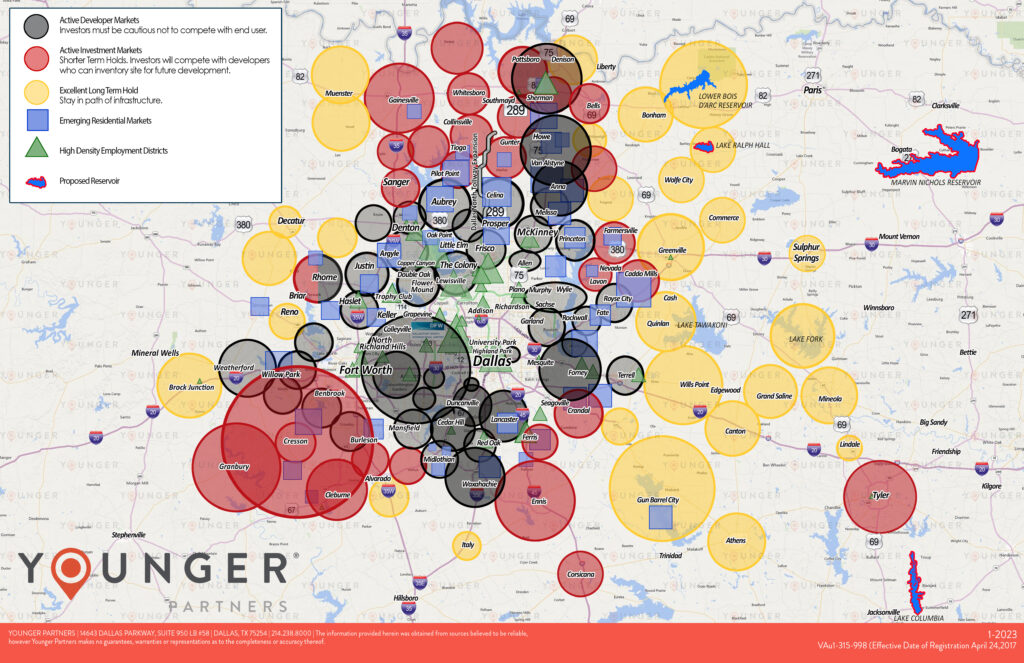
The North Central Texas land market is still influenced by its prior decade of escalating values, sales and absorption activity. To no surprise, first quarter 2023 land pricing and activity have been primarily affected by rapidly increasing interest rates, the lingering effects of COVID-19, an unstable Global political environment, continued rising inflation, and significant increases in construction costs. A minor disruption in the Oil and Gas market has had a lessening but significant impact on each of the major issues. In reviewing last year’s report, our observations have changed in reaction to the very visible shift in market activity. While listings have slowly increased, prices have seen only a moderate readjustment, sales volume has dramatically declined, and contract defaults (cancellations) are more frequent.
For many years, Younger Partners has produced a report to assist investors in reviewing the viability of acquiring undeveloped land for medium and long-term positive returns. As one of many prognosticators, we utilize our years of brokerage and research experience to add credibility to our observations.
Since our last report in late 2021, DFW has experienced continued growth from the momentum previously gained in most commercial and residential product types, but more recently transitioned to a more limited growth of investment-grade assets. Total transaction volume in the second half of 2022 significantly decreased for both user and investment product for all residential and commercial uses. New absorption of residential land, both developed and undeveloped, and underutilized land, has all but stopped except for well-financed projects currently under construction. One of the few highly respected residential monitoring services recently published a harrowing report for 2023 single-family absorption causing great concern and reactions among major homebuilders. Early 2023, however, has provided an indication that the prior momentum will be moderate and mildly sobering. As sales slow, a pause in planned developments might facilitate the healthy absorption of existing planned products. The single most pressing factor is increasing interest rates, which drives up the cost of construction loans and dramatically reduces the number of qualified home buyers. Year to date, however, while distinctly affected, the result again has been surprisingly moderate. A strong decrease in interest rates would serve pent-up demand in all property types as the single most recovery influence but is not immediately imminent.
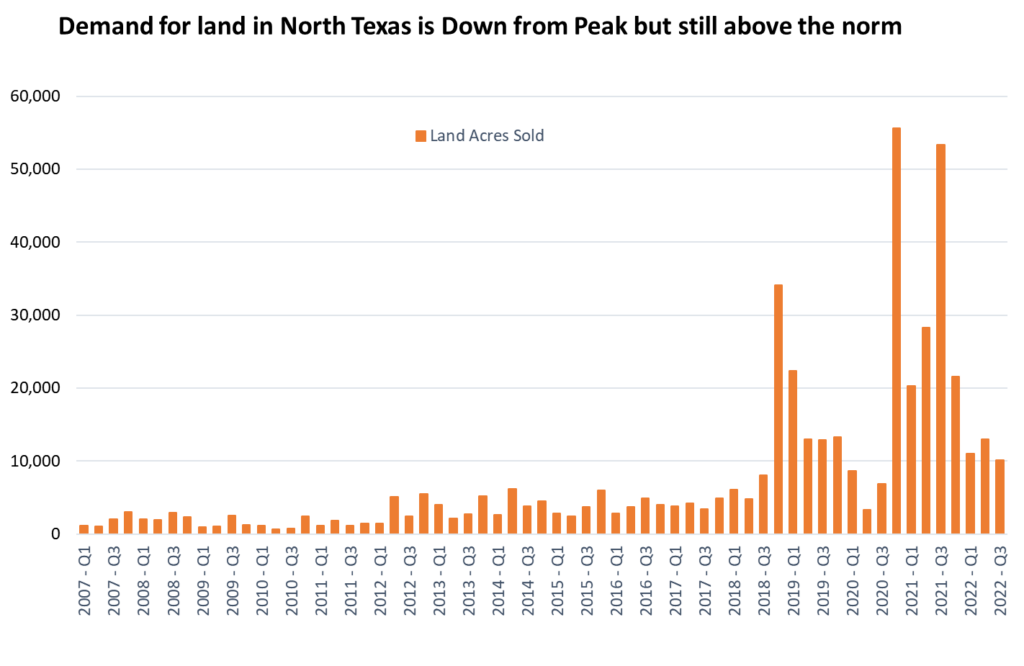
Submarkets which were either overlooked or previously bypassed in early 2022 saw significant activity based on proximity and access to core business centers, or much lower land prices. That trend has slowed along with any aggressive, new vertical development projects. The “work from home” popularity has allowed for peripheral residential projects to have more success based on lower land cost and smaller footprints.
Most peripheral sites are seeing steadily decreasing activity with employers still competing for employees who desire shorter commuting distances despite the COVID-19 flight to home office. “Work from home” continues to gain long-term acceptance by both employees and employers. Older surrounding communities, historically undisturbed by DFW’s growth, have achieved higher than normal growth since 2015. The significant momentum that Texas, and more specifically DFW, gained in company relocations and the commensurate inbound employee increases has moderately decreased, being balanced by the large number of layoffs in tech and finance. While few deny that an extended period of strong economic growth is proving vulnerable, actual project starts and announcements of pending projects still occur, but at a far fewer frequency. Based on the real estate industry’s obvious resistance to all the negative indicators, we have no reason to believe it will be either disastrous or long-term.
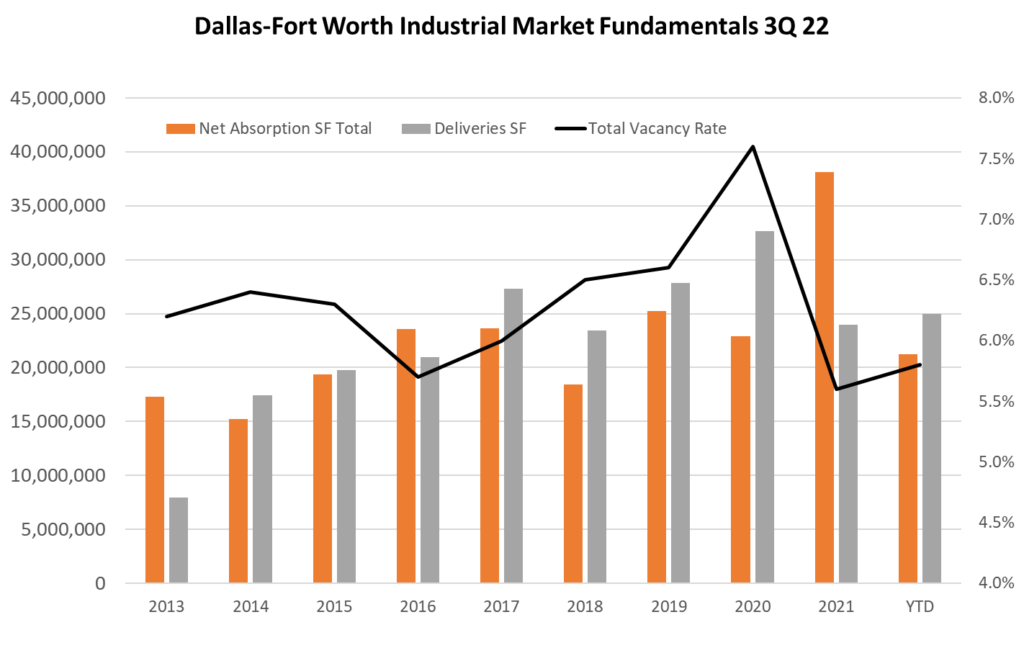
Supporting the long-term benefits in land investment, a readjustment should make labor available at a more reasonable cost and at more realistic materials pricing. DFW will remain one of the strongest employment and desired investment markets in the country. Deep cost adjustments, however, are still purely speculative for an undetermined period of time. We do not believe it will sink to levels of the late 1980s, the early 2000s or the 2008 severe down-market recessions. DFW has excellent momentum with a strong defense against a major recession.
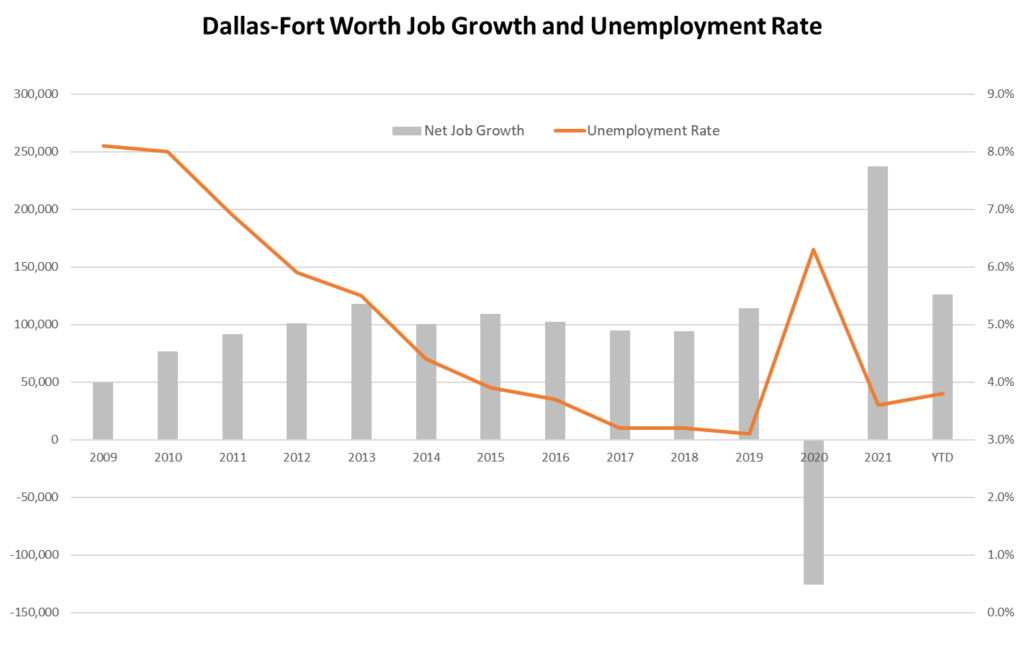
Despite sale prices at a multiple of replacement cost and surprisingly moderate positive retail demand, income-producing investments have maintained their active volume due largely to earlier low-interest rates, the need to invest 1031 trade equity and lack of competition by alternative investments. Capitalization rates early in 2022 approached record historical lows. To meet underwriting for either new debt or to remain conforming to existing debt, cap rates must adjust upward signaling initially moderate price reductions if an income property sale is desired. Excessive competition to acquire cash flow assets which remain resistant to the market cap rate adjustment, providing even the thinnest yields, will simply not occur until the financial markets adjust. The cyclical downturn in the national economy and a corresponding drop in physical occupancy will produce a dour impact and threatening or eliminating positive income property cash flows.
Inherently, land investment differs greatly from other types of real estate because of its inability to produce interim cash flow and its vulnerability to cycles. The criteria used to determine potential land opportunities, while becoming more sophisticated over the last two cycles, remains in implementing basic strategies. “Timing” has always determined the net result. We believe that any CRE recession will be short-lived because of the enormous equity investment that has been accumulated a lot of which is awaiting a readjustment and remains undeployed. Because it must produce a return at some point, it will return quickly when opportunity (chaos) is perceived.
Perhaps the most important part of a timing strategy is the ability to project and fund ownership long term. Positive liquidity and the ability to sell for an acceptable profit at the optimum market time can be highly speculative. Leveraging the investment only increases the risk. When an investor is placed in an imposed forced sale position or loses confidence in the future of the investment, returns are jeopardized and most frequently result in a significant loss.
There has yet to be a final cycle, although current sentiment seems to reject that possibility which is an optimistically shallow, inexperienced approach. The financial ability to hold long term investments will affect the yield and does offer a degree of safety. With access to historical data, projecting long-term value, while still speculative, is much more achievable and moderately lessens risk. One observation is watching the pricing of Investment Land migrating from price per acre to price per square foot. This significant change can be attributed more to the inflationary effect of the dollar across the full financial spectrum rather than the intrinsic value of the real estate.
Our Land Absorption Map shows all types of 2022 commercial and residential land activity in specific geographic submarkets. Resources used for the map include actual sales, current listings, and announcements of pending projects. Not difficult to understand, the progression from active to long-term generally follows the availability of infrastructure and newer expanding utility systems, including Municipal Utility Districts. Land currently available for vertical construction will bring significantly higher value over those that must wait for services or possess extraordinarily high-cost offsite access. Over the 20+ years of presenting this map, it is interesting to note that, while the circles have limited movement, the colors change and generally move out from the core in concentric circles. This iteration of the 2022 map displays the first series of circle reductions in 10 years north of DFW and the first set of expansions in south DFW and beyond.
Younger Partners is a founder and member of the highly respected North Texas Land Council (NTLC), a group of 50 active, knowledgeable, and talented land brokers in DFW. Believing that activity generates more activity, the North Texas Land Council, to the advantage of its clients, freely shares information with its competing members and the general market on a level of professionalism unusual within similar organizations. As such, the organization is a benefit to all clients and to those anticipating a land investment. Much of the projected activity displayed on the Younger Land Absorption Map (YLAM) reflects the activities of the NTLC, local and national reporting agencies, and our large group of active company partners.
Because of many increased cost factors, single-family new home prices increased almost 25 percent in a single year making affordability more difficult. Additionally, historically low, long-term interest rates dramatically increased single-family affordability through the first quarter of 2022. Less obvious are the increases in completed per square foot costs in all commercial sectors. The surprisingly continued strong national economy, despite disruptions, as well as strong, continued inbound relocations, have provided record employment and income. Short-term projections are predictable–long-term less so. Perhaps one of the strongest influences softening the impact of a correction is the enormous amount of uncommitted cash held by investors of all classes and liquidity awaiting their perception of pending opportunities. Once an opportunity is perceived, that liquid cash will be quickly redeployed and reinvested, steadying prices in the event of a devaluation caused by any number of external influences. Investors, incorrectly or not, wishing to miss an anticipated opportunity (chaos) will move quickly. An improving stock market and strong oil and gas prices have contributed to lessening the attraction of real estate.
Perhaps the most important part of a timing strategy is the ability to project and fund ownership long term. Positive liquidity and the ability to sell for an acceptable profit at the optimum market time can be highly speculative. Leveraging the investment only increases the risk. When an investor is placed in an imposed forced sale position or loses confidence in the future of the investment, returns are jeopardized and most frequently result in a significant loss.
There has yet to be a final cycle, although current sentiment seems to reject that possibility which is an optimistically shallow, inexperienced approach. The financial ability to hold long term investments will affect the yield and does offer a degree of safety. With access to historical data, projecting long-term value, while still speculative, is much more achievable and moderately lessens risk. One observation is watching the pricing of Investment Land migrating from price per acre to price per square foot. This significant change can be attributed more to the inflationary effect of the dollar across the full financial spectrum rather than the intrinsic value of the real estate.
Our Land Absorption Map shows all types of 2022 commercial and residential land activity in specific geographic submarkets. Resources used for the map include actual sales, current listings, and announcements of pending projects. Not difficult to understand, the progression from active to long-term generally follows the availability of infrastructure and newer expanding utility systems, including Municipal Utility Districts. Land currently available for vertical construction will bring significantly higher value over those that must wait for services or possess extraordinarily high-cost offsite access. Over the 20+ years of presenting this map, it is interesting to note that, while the circles have limited movement, the colors change and generally move out from the core in concentric circles. This iteration of the 2022 map displays the first series of circle reductions in 10 years north of DFW and the first set of expansions in south DFW and beyond.
Younger Partners is a founder and member of the highly respected North Texas Land Council (NTLC), a group of 50 active, knowledgeable, and talented land brokers in DFW. Believing that activity generates more activity, the North Texas Land Council, to the advantage of its clients, freely shares information with its competing members and the general market on a level of professionalism unusual within similar organizations. As such, the organization is a benefit to all clients and to those anticipating a land investment. Much of the projected activity displayed on the Younger Land Absorption Map (YLAM) reflects the activities of the NTLC, local and national reporting agencies, and our large group of active company partners.
Because of many increased cost factors, single-family new home prices increased almost 25 percent in a single year making affordability more difficult. Additionally, historically low, long-term interest rates dramatically increased single-family affordability through the first quarter of 2022. Less obvious are the increases in completed per square foot costs in all commercial sectors. The surprisingly continued strong national economy, despite disruptions, as well as strong, continued inbound relocations, have provided record employment and income. Short-term projections are predictable–long-term less so. Perhaps one of the strongest influences softening the impact of a correction is the enormous amount of uncommitted cash held by investors of all classes and liquidity awaiting their perception of pending opportunities. Once an opportunity is perceived that liquid cash will be quickly redeployed and reinvested, steadying prices in the event of a devaluation caused by any number of external influences. Investors, incorrectly or not, wishing to miss an anticipated opportunity (chaos) will move quickly. An improving stock market and strong oil and gas prices have contributed to lessening the attraction of real estate.
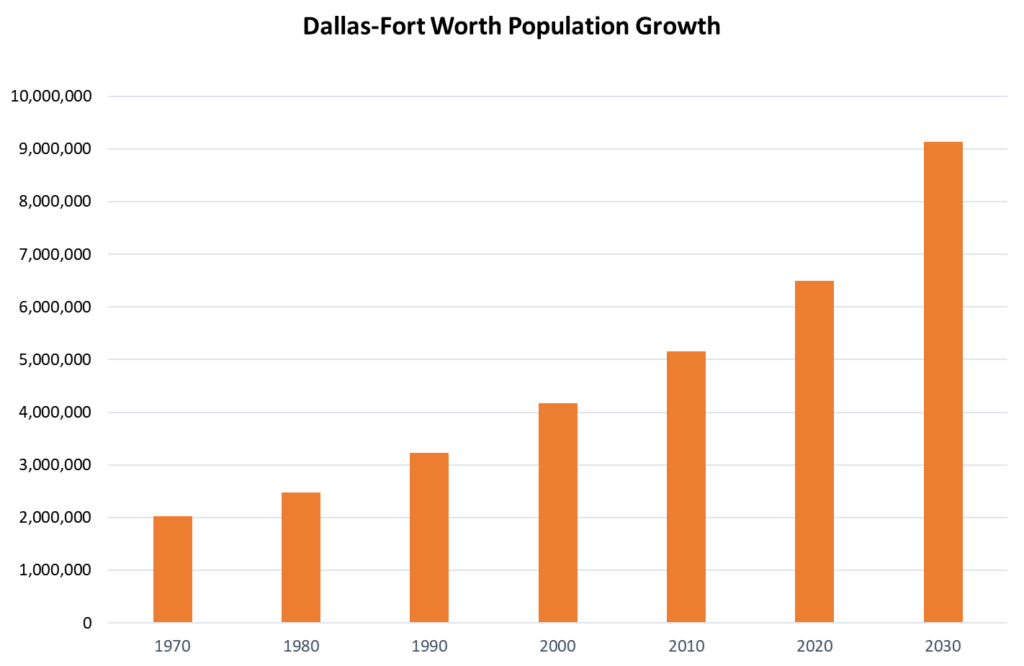
Our continuing extended analysis, as displayed on the “Younger Land Absorption Map” (revised December 2022) is principally based on historical data utilizing over 200 years of market experience held by Younger Partners associates, members of the NTLC, and reliable future projections from sources that have traditionally displayed accurate information. Our market demographic information was provided by Younger Partners’ Steve Triolet, Director of Research, and Michael Ytem, Senior Vice President. As projected earlier, the DFW market still expects to absorb an additional expansion of more than 20,000 acres over the next 15 to 20 years. Recent acquisitions by qualified mixed-use developers, if restarted, threaten to shorten the total absorption time to one-half the projections. We have always had cycles, and this too shall pass.
In conclusion, the principles of sophisticated investing must include and utilize primary criteria. Reviewing the history of our land absorption maps provides distinct, valuable trends in growth well applicable to intelligent investing. Access to infrastructure, the admirably increased effort of developers to utilize available land in our fertile southern corridor, absorption of the remaining few infill sites, high suburban infill land costs, and the migration of employment centers will all play significant roles in prudent land investment decisions. Historically in the investment process, the only remaining elements are sound financial strength and patience.
CoStar News, Financial Firm’s Massive Dallas-Area Layoffs Comes as Sublease Space Reaches New Heights
Genpact’s OpenWealth To Lay Off Nearly 1,000 Employees in Dallas Area
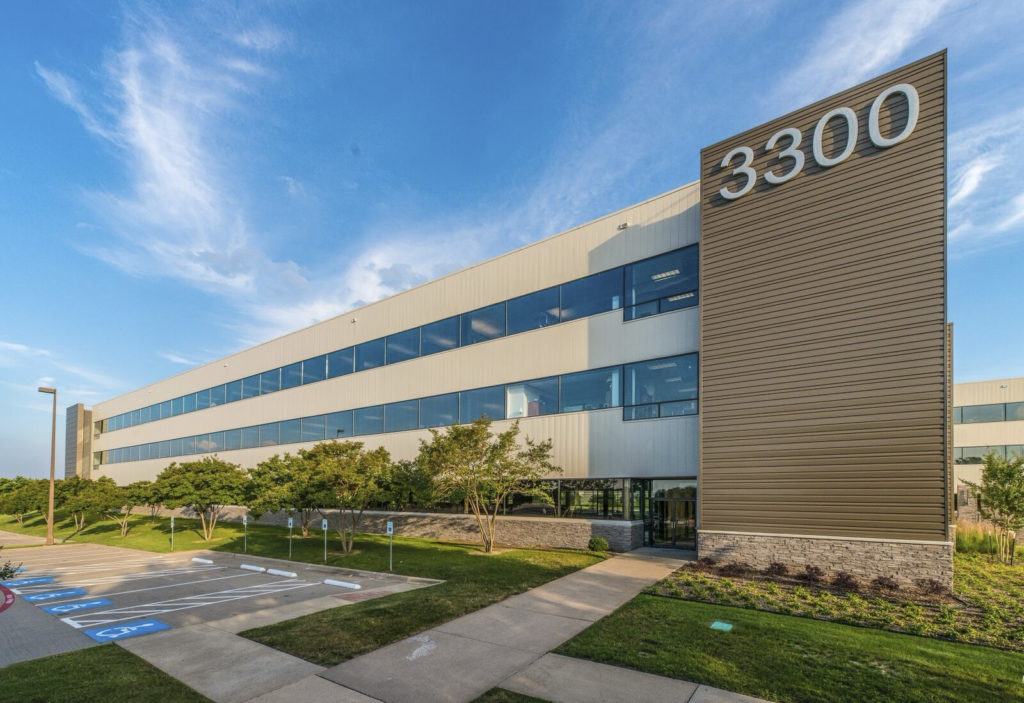
OpenWealth, the financial services subsidiary of Genpact, plans to lay off 964 employees at this office building in Richardson, Texas, effective March 31. (CoStar)
By Candace Carlisle
CoStar News
January 25, 2023 | 6:16 P.M.
Financial advisory and wealth management firm OpenWealth, a subsidiary of New York City-based Genpact, plans to lay off nearly 1,000 employees in the Dallas area by the end of March after one of its clients decided it no longer needs the firm’s services.
The layoffs span a variety of positions at 3300 E. Renner Road in Richardson, Texas, about 20 miles north of downtown Dallas. The layoffs of 964 employees are expected to become effective on March 31, according to a Worker Adjustment and Retraining Notification letter the company sent to the Texas Workforce Commission. Genpact is one of Richardson’s largest employers with 2,500 employees as of 2021.
A Genpact spokeswoman declined to share the details of its “confidential client engagements” but confirmed there was “a business decision by one of our clients that affects the roles of some of our Richardson team.” According to CoStar data, the company has a lease totaling nearly 185,000 square feet of office space at the address.
“Responding to rapidly changing client needs is a standard part of Genpact’s agile operations model,” said Danielle D’Angelo, marketing and communication leader of the Americas for Genpact, in an email to CoStar News. “We’re committed to handling every transition thoughtfully and smoothly and ensuring everyone is treated fairly and respectfully. Richardson remains a strategic market for us, and we have several clients for whom we manage services in this location.”
D’Angelo did not immediately respond to a question by CoStar News asking about the real estate impacts of the layoffs.
Job cuts in the financial services industry have been ongoing with more expected as rising interest rates and difficulty in borrowing debt weigh on the industry. Some of the recent layoffs to hit North Texas are tied to mortgages as rising interest rates impact lending on homes.
There is more than 11 million square feet of sublease space on the Dallas-Fort Worth market, setting a new high watermark for the nation’s fourth-largest metropolitan area, said Andrew Matheny, Transwestern’s research manager in Dallas-Fort Worth.
“The demand for office space will slow down as the business cycle slows down and hiring slows,” Matheny told CoStar News.
Up until this month, Genpact was contributing to that mountain of sublease space with about 86,000 square feet of office space at 3101 E. President George Bush Turnpike on the sublease market. That lease has expired and is now available for tenants to lease directly from the landlord, Matheny said.
Steve Triolet, research manager for Dallas-based Younger Partners, said he expects the amount of subleased office space in Dallas-Fort Worth to meet a new threshold by mid-2023.
“We are on a trajectory to hit 12 million square feet of sublease office space being on the market by mid-2023 based on how much has been added in the last few months,” Triolet told CoStar News. “Some of that space rolls off into direct space — like in Genpact’s case — but more is coming to the market than is being converted to direct vacant space.”
Recent tech industry layoffs add another wrinkle to the office leasing story, Triolet said, with Salesforce yet to add some of its Dallas space to the sublease market like they have in San Francisco. Earlier this month, Salesforce executives told regulators the layoffs would result in a reduction in office space in “certain markets.”
Triolet told CoStar News he’s closely watching to see how those national layoffs trickle into the Dallas-Fort Worth region. If the job market softens, he said, it could once again impact the demand for office space.
“Since there’s been more clarity on hybrid work, it seems the sublease market is increasing,” he said. “There’s sublease space of every shape and size in Uptown, Far North Dallas, Las Colinas-Irving, Richardson and Plano.”
Big Spaces
Some of the office sublease market in Dallas-Fort Worth has begun to get stale, even as it has grown, but new space routinely comes to the market. Ride-hailing company Uber, which listed more than 100,000 square feet of office space on the sublease market in 2020, later scaling down its expansion plans to Dallas and forgoing millions of incentives, has only added to its sublease profile. The available space in the initial phase of The Epic expires this year, rolling for the sublease market, however, Uber has nearly 364,000 square feet of space available for sublease spanning 13 floors of the 23-story office tower, which was completed last year. CBRE is marketing the sublease to would-be tenants on behalf of Uber, according to a marketing brochure.

Reata Pharmaceuticals has been marketing its entire build-to-suit project — a 21-story, 327,000-square-foot office building at 6100 Legacy Drive in Plano — for sublease since last year. CBRE has been marketing the sublease to would-be tenants, which might be a few tenants rather than a single tenant, according to marketing materials. The building, completed in 2021, is still in shell condition.
Meanwhile, another Deep Ellum space is on the sublease market, with fast-growing startup Bestow listing its office space totaling more than 40,000 square feet spanning two floors, fully furnished and designed without the Dallas-based digital life insurance company ever taking occupancy of the space at The Stack Deep Ellum at 2700 Commerce St. in Dallas. Bestow’s office lease — and thus the sublease — runs through the end of January 2034. Dallas-based Altschuler and Co. is marketing the sublease on behalf of Bestow, according to marketing materials.
Triolet said he sees the most traction for subleases being between 3,000 square feet and 10,000 square feet, with office tenants actively taking down subleases in that range on a regular basis. For the bigger spaces, Triolet said it’s likely they will need to chip away at them with smaller deals.
Preparing for the Return of Headquarter Relocations to Texas
One of the unintended consequences of our sharply rising mortgage rates is the dramatic slowdown in corporate relocations. As the frenzy of commercial real estate activity cools in Texas, savvy business leaders should take this time to reassess their space needs and put thoughtful strategies in place before the market rebounds.
In the near term, C-suite executives understand that most homeowners are extremely hesitant to relocate and purchase a new home because of the higher costs. Over 80 percent of residential mortgages are currently financed at an interest rate less than 3.5 percent, which is well below the 7 percent rate for a 30-year loan today.
Before the recent interest rate hikes, Texas was a hotbed of relocations with 63 companies making a move in 2021. Although this year is not completely over, less than a third of that volume, or 17 companies to be precise, came to the state in 2022.
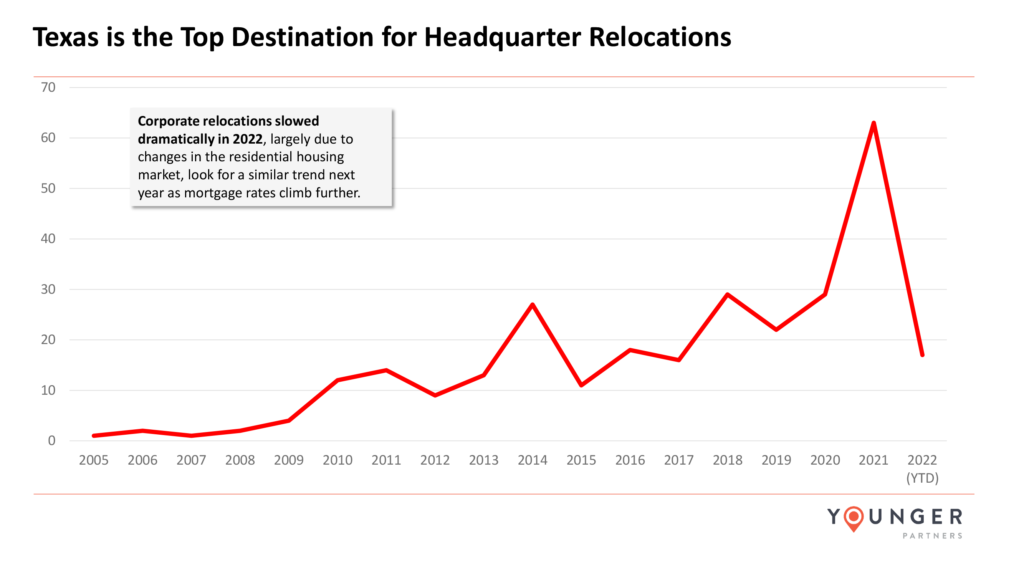
History proves that the housing market will rise again, just as it did from the recession of 2008 when the recovery was slow and residential markets didn’t stabilize until 2012/2013. Although the future uptick is expected to come quicker than the last cycle, timing is still uncertain.
When companies do make the decision to relocate to Texas, almost half will choose Dallas-Fort Worth over the rest of the state. Austin did have a moment in 2021 with a slew of technology relocations, but the historic numbers favor the Dallas-Fort Worth market overall.
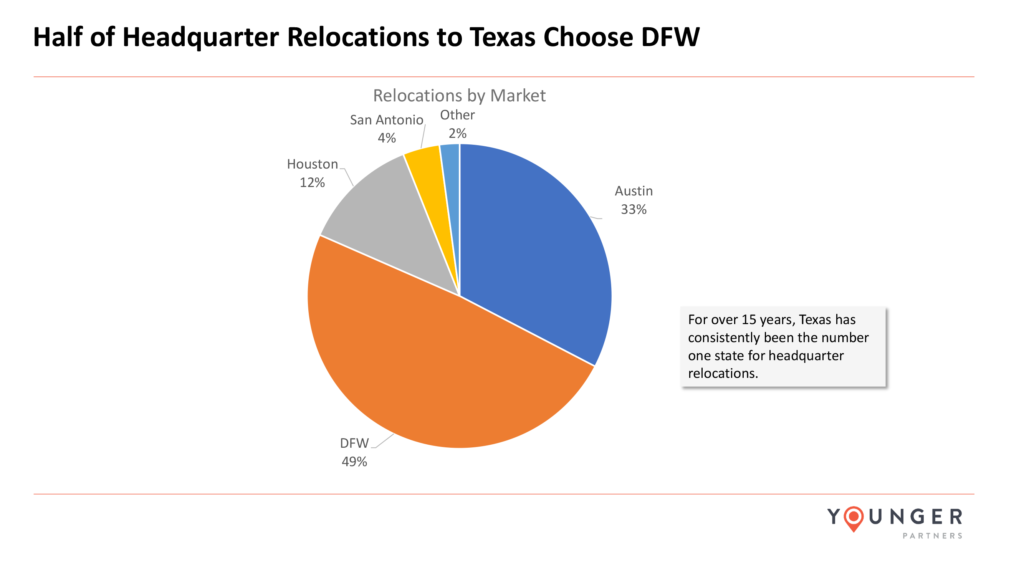
With fewer companies touring for potential relocations, office demand is low across Texas. Active large tenants are down roughly 40 percent compared to pre-Covid levels, which is anticipated to last another year or two. Once residential activity adjusts, relocations will be surging into Texas again.
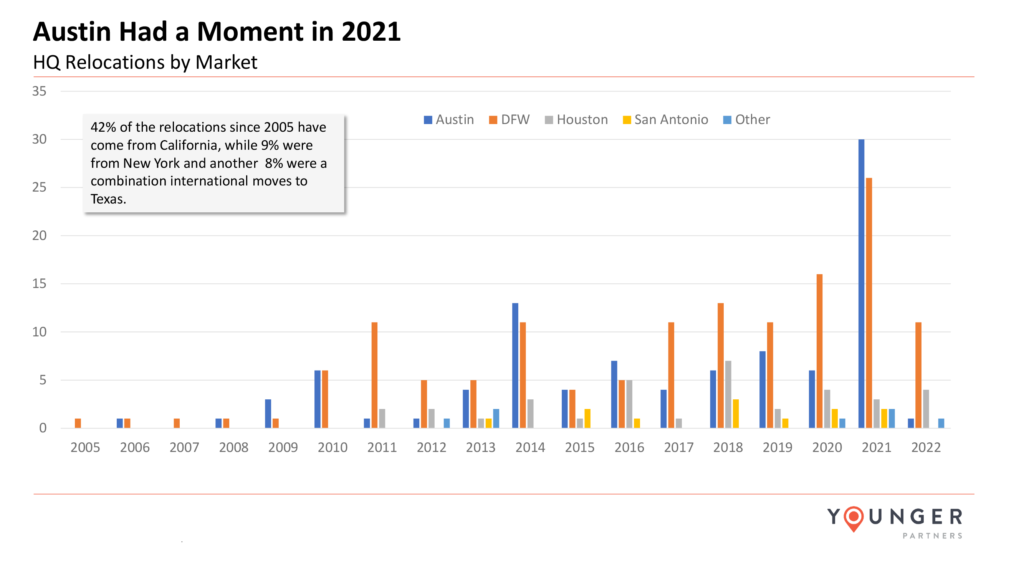
Until that time, corporate leaders should partner with a commercial real estate advisor who can assist with some of the relocation preparations in advance, including:
- Selecting a target submarket that will complement business needs
- Buying land for future development, if needed
- Understanding how major infrastructure developments in the area will affect commutes and labor pools
- Securing economic incentives offered for corporations coming into Texas, or specifically the Dallas-Fort Worth market
- Adjusting the corporate real estate strategy to accommodate hybrid or remote workers
- Creating efficiencies that will reduce relocation costs.
1 Dust Group Takes Space at North Dallas Business Park
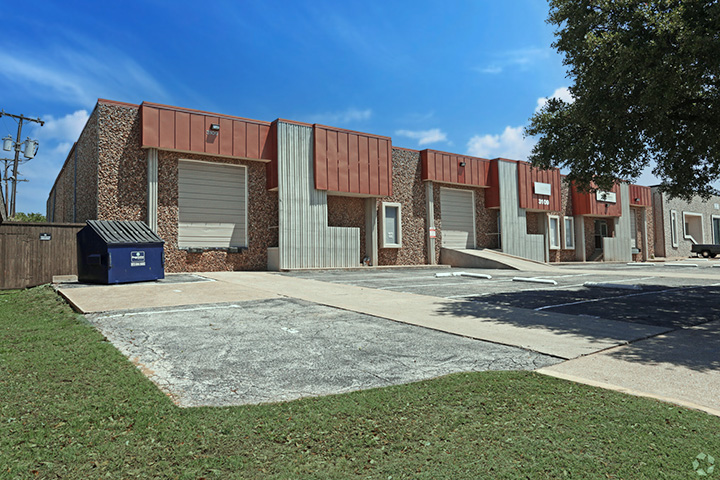
1 Dust Group leased 6,686 square feet at North Dallas Business Park, 3109 Garden Brook Dr. in Farmers Branch. Elaine Xu at Younger Partners represented the tenant.
The wholesale electronic products business, which has been providing warehouse and fulfillment services to clients in Asia since 2018, saw an opportunity to expand its existing U.S. business lines with a relocation from Mo. to Texas. North Dallas Business Park’s centralized location will enable 1 Dust Group to provide added storage solutions and quicker fulfillment for customers.
“Dallas-Fort Worth continues to be a magnet for regional, national and even international businesses like 1 Dust Group,” says Xu. “Fulfillment centers such as this benefit from our shipping infrastructure, lower operational costs, favorable tax rates and huge talent pool.”
Front Porch Pantry Delivers Fresh Meals from a 26,000-Square-Foot Food Production Facility
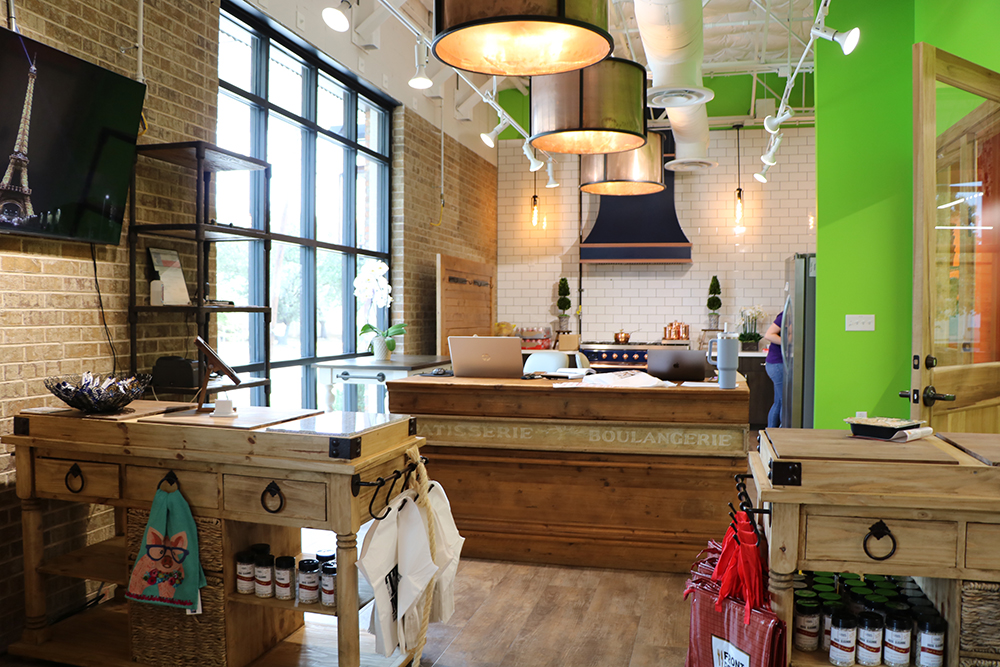

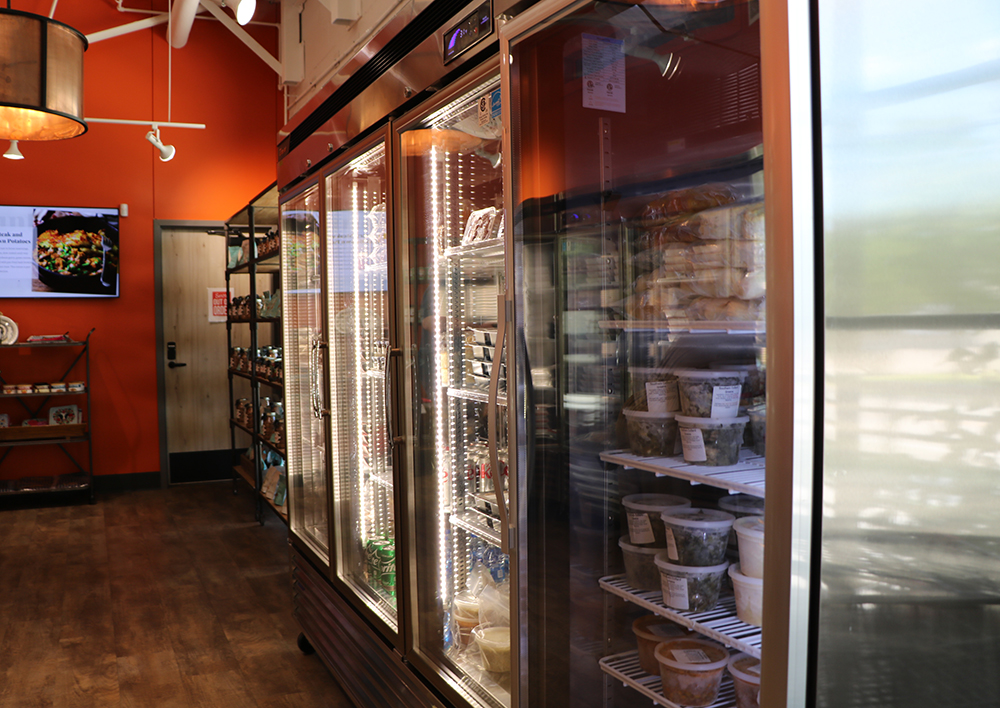
Front Porch Pantry was a relatively unknown contender in the prepared meal delivery business when it launched in 2016 from a small deli kitchen at the back of an Addison liquor store. The Dallas-based company now competes with the likes of Freshly and Factor and ships over 50,000 meals a month across Texas, Oklahoma, Arkansas, and Louisiana.
Founder and Managing Partner Michaelann Dykes claimed her stake in the $10.29 billion global industry with a mission to help busy people eat healthy by delivering tasty home-cooked meals to their doorstep. She began by assembling a cookbook of ‘family favorite’ recipes and started testing her meals.
“The first deli kitchen was fine for making sure my recipes could be precooked from fresh ingredients and reheated without compromise,” says Dykes. Front Porch Pantry initially had two to three customers a week and quickly expanded to a large customer base in the Dallas area. Dykes says the company has an 88% loyalty rate today.
As the menu options for Front Porch Pantry grew, so did the need for more sophisticated real estate. Within the first year, Dykes sought assistance from Tanja McAleavey of Younger Partners who located a commercial gluten-free kitchen with accommodations that were prime for clean cooking. The new facility came with a space expansion option and gave Front Porch Pantry the edge it needed to accelerate in an industry experiencing compound annual growth rate of 13.5%.
In 2019, McAleavey teamed with Jerry Averyt of Younger Partners to find an even larger floor plate that could further scale with company progress. Front Porch Pantry purchased a former office warehouse located at 4600 McEwen Road in Farmers Branch and the pandemic struck during finish-out. Supply chain issues stalled renovations, affecting everything from commercial stoves and plumbing, to build-out on the office and walk-up retail areas. This happened just as Front Porch Pantry’s business, and the prepared meal delivery industry, was skyrocketing.
“No one could have predicted a pandemic that would astronomically affect the industry. Everyone was searching for great meal delivery options, and Front Porch Pantry had them,” says Dykes. “We had difficulty getting many necessary ingredients but with our extensive catalog of recipes, we were able to write and modify recipes according to what was available.”
The doors opened at the new facility in September 2021 and momentum remains strong for Front Porch Pantry. Dykes expects to escalate eight times the current volume as the business takes a national focus.
“Our online ratings speak for themselves. Even customers who love to cook are busy. We give them great taste, great value, and the added convenience of having fully cooked dinners delivered right to the front porch. We deliver in Texas, Oklahoma, Louisiana and Arkansas and look forward to expanding nationwide,” says Dykes.
Front Porch Pantry contact info:
(972) 925-0526
contact@frontporchpantry.com
www.frontporchpantry.com
Kathy Permenter Featured on KRLD CEO Spotlight
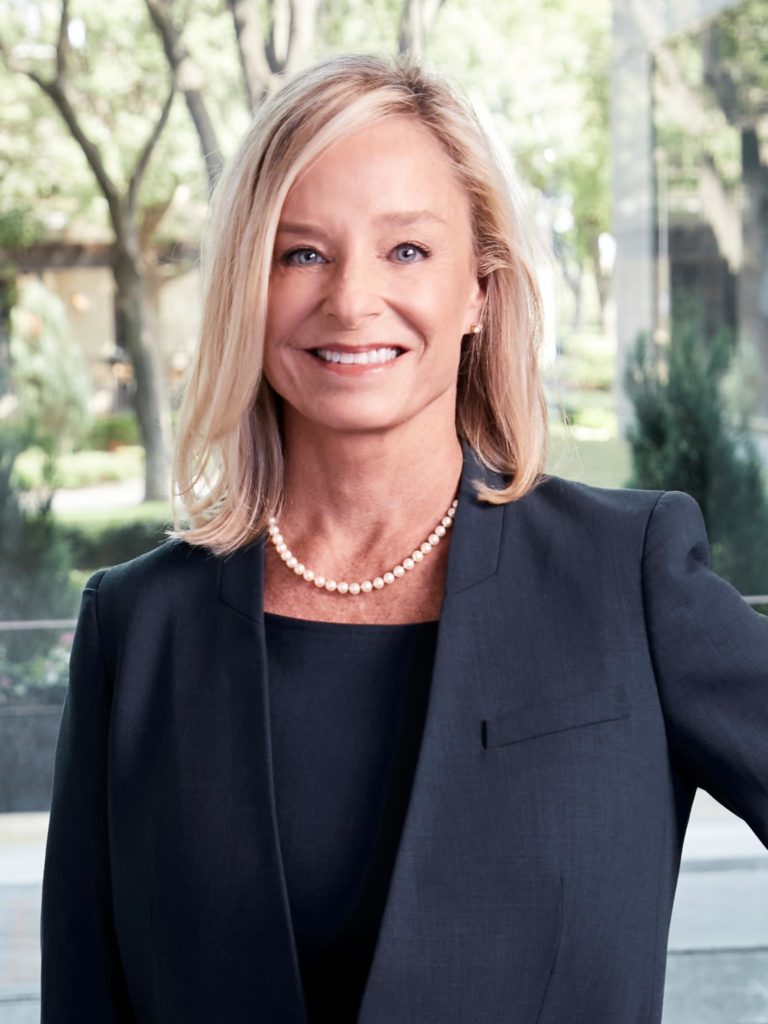
Younger Partners Co-Managing Partner Kathy Permenter talks about the company’s recent acquisition of Crockett Row during an interview with David Johnson, host of CEO Spotlight on KRLD 1080-AM.
>>Click here to listen to the August 16, 2022, podcast to learn about upgrades planned for the 282,000-square-foot mixed-use development in Fort Worth’s Cultural District.
Younger Partners Investments Acquires Crockett Row
FORT WORTH, Texas (August 9, 2022) – Younger Partners Investments (YPI) acquired Crockett Row, a 282,334-square-foot urban village with five blocks of pedestrian-friendly Class A retail and office space. Located at the southeast corner of University Drive and West 7th Street, the property sits within the city’s Cultural District just west of downtown Fort Worth.
Younger Partners’ Co-Managing Partners Kathy Permenter and Moody Younger, and YPI Managing Director Micah Ashford, represented YPI in the acquisition. Financing was arranged by Adam Mengacci of Hamilton Realty Finance. Mark Sloan and Jacob Dow at Holland & Knight provided legal representation. Terms of the deal, which was the third acquisition for YPI, were undisclosed.
Embedded within Fort Worth’s larger live-work-play West 7th development, Crockett Row is surrounded by world-class museums, eateries, pubs and entertainment venues, including the new state-of-the-art Dickies Arena. Developed in 2009, Crockett Row’s overall occupancy at the time of closing was 74.6 percent, presenting lucrative opportunities for new tenants to join Movie Tavern, LA Fitness, Fidelity Investments, PMG and Common Desk on the property roster. Younger Partners will handle the property management and leasing of the property.
YPI has plans to freshen the brand and to make improvements to enhance customer experience through the addition of gathering spaces, parking technology to help locate open spaces, improved signage and additional elevators. “We also plan to work with the City to enhance accessibility throughout the property,” said Younger.
“Crockett Row was a target investment for us because of its strong supporting demographic and iconic location in the Cultural District, next to some of Fort Worth’s most affluent neighborhoods,” said Permenter. “The amount of tenant interest in this neighborhood has already far exceeded expectations.”
Crockett Row will benefit from upcoming developments to the area, including Crescent-Fort Worth, bringing 200 luxury hotel rooms, 170,000 square feet of office, and 17 multifamily units within a block from the property in mid-2023. Directly across the street from Crockett Row, the Van Zandt will deliver 147 multifamily units, 100,000 square feet of office and 11,000 square feet of retail, along with upcoming additions Triune Centre, Burnett Lofts and Encore Panther Island.
About Younger Partners
Dallas-based Younger Partners is a full-service boutique commercial real estate firm providing investment, leasing, and management services to investors and tenants in the Dallas/Fort Worth region. They specialize in the acquisition and disposition of land, multifamily, office, industrial and retail properties. Younger Partners Investments (YPI) is a Younger Partner platform designed to acquire retail properties. Launched in July 2020, YPI targets retail properties from lifestyle to neighborhood centers throughout the DFW area. Younger Partners and YPI are also affiliated with newly formed Apricus Realty Capital.
